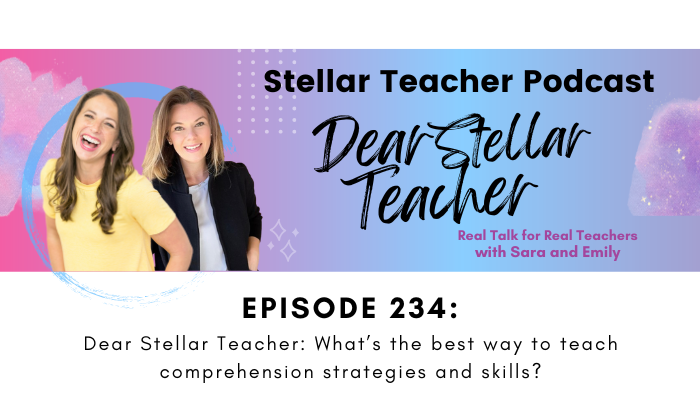
Click play below to hear research-based ideas on how to teach comprehension strategies and skills.
Wondering how to teach comprehension effectively? You’re not alone. In this month’s Dear Stellar Teacher segment, Emily joins me to answer a listener question about whether to teach comprehension strategies, like finding the main idea, before diving into a text. This question opens the door to an insightful conversation about shifting from traditional methods to evidence-based practices that truly help students comprehend what they read.
In this episode, we explore why the classic “strategy of the week” approach may not be the best way to teach comprehension. Instead, we highlight the importance of creating the right conditions for comprehension, including building background knowledge, focusing on syntax, and selecting text-dependent practices. By understanding how comprehension works as an outcome of multiple factors, you’ll feel empowered to teach comprehension in a way that truly benefits your students.
If you’re ready to refine your approach and discover better ways to teach comprehension, don’t miss our FREE Comprehension Reset Challenge. Starting January 11th, 2025, this week-long virtual event will transform how you approach comprehension instruction. Sign up at stellarteacher.com/reset. Let’s kick off the new year with strategies that lead to lasting success!
Do you have a burning question you want us to explore on the podcast? Or maybe you have an amazing story that deserves a shout-out? We’d be thrilled to feature your question or stellar story on the show! Simply fill out this form. We can’t wait to hear from you!
In this episode on how to teach comprehension, we share:
- Why the traditional “strategy of the week” approach might not be the best way to teach comprehension.
- The importance of focusing on comprehension as an outcome rather than an isolated skill.
- How creating the right conditions, such as building background knowledge and focusing on syntax, supports comprehension.
- The role of Scarborough’s Reading Rope in understanding the interconnected elements of skilled reading.
- Why state standards should be seen as end-of-year goals rather than a checklist for teaching comprehension.
- How to shift your mindset to teach comprehension in ways that align with research and benefit your students.
Resources:
- Sign up for our Free Comprehension Reset Challenge.
- Join The Stellar Literacy Collective
- Fill out the Dear Stellar Teacher form for a chance to be featured on a future episode.
- Sign up for my Private Podcast: Confident Writer Systems Series
- Sign up for my FREE Revision Made Easy email series
- If you’re enjoying this podcast, please leave a review on Apple Podcasts!
Related Episodes:
- Episode 229, Dear Stellar Teacher: How can I make a familiar book or resource feel fresh and engaging for my students?
- Episode 225, Dear Stellar Teacher: What Should Grading Look Like in My Classroom?
- Episode 221, Dear Stellar Teacher: How Do I Fit Everything Into My Literacy Block?
- Episode 182, What We Need to Understand About Reading Comprehension (And 8 Instructional Strategies)
Connect with me:
- Email us questions or share a teaching story: [email protected]
- Join my newsletter
- Shop my TPT store here
- Instagram: @thestellarteachercompany
- Facebook: The Stellar Teacher Company
More About Stellar Teacher Podcast:
Welcome to the Stellar Teacher Podcast! We believe teaching literacy is a skill. It takes a lot of time, practice, and effort to be good at it. This podcast will show you how to level up your literacy instruction and make a massive impact on your students, all while having a little fun!
Your host, Sara Marye, is a literacy specialist passionate about helping elementary teachers around the world pass on their love of reading to their students. She has over a decade of experience working as a classroom teacher and school administrator. Sara has made it her mission to create high-quality, no-fluff resources and lesson ideas that are both meaningful and engaging for young readers.
Each week, Sara and her guests will share their knowledge, tips, and tricks so that you can feel confident in your ability to transform your students into life-long readers.
Tune in on your favorite podcast platform: Apple, Google, Amazon, Spotify, Castbox, and more! If you’re loving this podcast, please rate, review, and follow!
Podcast (stellar-teacher-podcast): Play in new window | Download
Sara
Hey, teachers, welcome back to another episode of our Dear Stellar Teacher monthly segment. This is where I have my teammate, Emily, join me, and we have more of a casual conversation about all things related to literacy. So, Emily, always good to see you. Thanks for joining me today.
Emily
Hey, Sara. I cannot believe it’s January.
Sara
I know, I’m kind of struggling with that. I feel like the last three months of the year went by so fast. I’m still mentally back in, like, October.
Emily
I know, I know. The end of the year always just seems to whip right around.
Sara
But also, I’m one of those people who, even though I don’t always follow through with them, I love setting New Year’s resolutions. I love goal setting and having a fresh start. All of the bad habits I let build up at the end of last year—I’m like, “Alright, those are done, and now we can start fresh again.” So I do appreciate the fresh start.
Emily
Yeah. Speaking of New Year’s resolutions, last year, I made it a point during 2024 to spend less time on my phone and more time reading books. So that leads me to ask you, what were your favorite books of 2024?
Sara
Okay, I’m glad you asked about favorite books, because if you had asked for just one favorite, I don’t think I could have chosen!
Emily
When I first thought about asking, I was like, “Sara, let’s talk about our favorite book from 2024,” but then I looked at my list and thought, “Ooh, I have to mention more than one.”
Sara
Yeah, same! One of the things I love about our team is that we all really enjoy reading, so we often talk about the books that we read. I also share books that I am reading with our audience as well. So, I was going back through my Goodreads list—because I use Goodreads to keep track of my books—and it reminded me of some really great ones I read last year. I always set a reading goal, and I love crossing off books as I finish them. At the end of the year, Goodreads shows me a year-end review, with the covers of all the books I read, and it’s such a great way to reflect. Looking back at my list, I realized I read some really good books last year. I think I have three—maybe four—books that I really, really enjoyed.
The first one was The Many Lives of Mama Love by Lara Love Hardin. It’s a memoir, and I love reading about real people and real stories. This one was just so shocking. From the beginning, I was like, “What? This was somebody’s real life?” So I loved that.
Emily
I agree! That story really opened my eyes to the whole system. And you recommended that book to me, so thank you—it was one of my top reads too.
Sara
I’m so glad you enjoyed it! Another book I loved last year—I don’t want to call it a throwaway, or low quality book, but it’s a different vibe—was Fourth Wing and Iron Flame. I got into those last year, and now I’m counting down the days until The Onyx Storm comes out. It’s categorized as a romantasy – I think that the correct category for that – so that’s on my list.
I also really enjoyed The Wedding People by Allison Espach. It’s dark fiction with a lot of comedy, and I think I liked it so much because it was so surprising. It’s about a wedding weekend, but I don’t want to give too much away. It’s fiction, it’s dark, it’s funny, it’s surprising, and I love how she ended it.
Finally, the last book I read in 2024 that I absolutely loved was The Unmaking of June Farrow by Adrienne Young. Our teammate Kori recommended it to me, and I devoured it in about four days. It’s a time travel book, which I don’t usually love, but this one was so good. It surprised me, and I think that’s why I loved it so much.
Again, I tend to like books that surprise me, or books that have unexpected endings, or have shocking stories.
What about you?
Emily
Okay, so we have some overlap—not surprised! I completely agree with you about The Many Lives of Mama Love. That book was fantastic. And I am a romantic girl, so of course, I loved Iron Flame and Fourth Wing. If you haven’t read them already, the third one is coming out in January, so I’m really excited for that.
Another book I loved was Evidence of the Affair by Taylor Jenkins Reid. It’s a short story, but I read it in March, and I’m still thinking about it. That’s when you know it’s good.
Sara
I love Taylor Jenkins Reid! I don’t think I’ve read a book by her that I didn’t enjoy.
Emily
Same here. My top favorite, though, was The Women by Kristin Hannah.
Sara
Oh, I need to amend my list and add that one because I forgot I read it! I don’t usually love historical fiction, but I love anything that Kristin Hannah writes.
Emily
Kristin Hannah is definitely my favorite author. I just read another book by her, Night Road, and it’s about grief. I devoured it in three days—it was so good. She’s my favorite author.
Sara
I’ll have to add that to my list. For all the avid readers out there, if you haven’t read these books, definitely add them to your list. Happy reading in 2025!
Sara
Okay, let’s jump in. What is our question for this week?
Emily
Our question from our audience this week is a really good one, and I feel like it’s probably on a lot of teachers’ minds. So, I’m really glad we’re talking about it today.
The question is: What’s the best way to teach comprehension strategies and skills like finding the main idea? I’d think you do a mini lesson and then apply it to a real text. But our current series does the opposite. We read a text, the teacher leads a discussion about the main idea without any prior mention of it, and then we do a mini lesson. It’s confusing and frustrating to me because it goes against what I’ve always done. Shouldn’t we teach the skill first before applying it to a text?
This is such a great question, because, yeah, we’re kind of flipping the script here recently. But I just want to zoom in on one part of this question before we dive into the rest, specifically where she says, “This goes against what we’ve always done.”
This is kind of a soapbox of mine, because I want to point out that change is inevitable. If you’ve always done something one way, I want you to really think about whether or not that way works. Are your students truly learning from it? Are you doing it this way because it’s familiar to you, or because it’s what’s best for students?
I know it’s a tough pill to swallow when we realize we’ve been doing something wrong for years. Or, as we learn more about the science of reading, we think, “Yeah, I definitely didn’t do it that way when I was in the classroom.” But it’s an even tougher pill to swallow to keep doing things that don’t serve students well.
So, I really encourage you, even though it’s uncomfortable—because growth is uncomfortable—to examine what you’re currently doing. Ultimately, we all want to feel successful and happy in our profession, and watching students succeed makes us happy. So, even though change is tough, if new research shows better ways to do things, we owe it to our students to make adjustments.
Sara
Yeah, I love this question, and I feel like a lot of teachers, especially in upper elementary, are wondering, “Okay, how are we supposed to teach comprehension? Strategy of the week is how we’ve always done it. Are we still supposed to do it that way?”
I really appreciate what you said, Emily—how just because something feels uncomfortable for us doesn’t mean it’s bad for our students. We have to make sure we’re constantly examining our practices.
And I will definitely answer this question directly, but before that, I want to validate the teacher’s frustration and confusion.
I left the classroom before I started learning about the science of reading, but I definitely experienced that same confusion and frustration. At first, when I heard about the science of reading, I took it personally, as if it was an attack on my knowledge and the way I was teaching.
But I had to step back and realize that this isn’t about me. If I’m reading research that shows a practice I used in the classroom is ineffective, that doesn’t mean I was a bad teacher. It just means I need to be open to hearing what the research says and willing to make changes to do what’s best for kids.
It can be frustrating and confusing, but we have to put our feelings aside and focus on what’s best for students.
When I was in the classroom, I taught exactly the way this teacher described. I’d do a mini lesson and then apply it. For example, this week is main idea: here’s the lesson, here’s the text where we practice it. Next week is summarizing: here’s the lesson, here’s the text to practice it.
I definitely taught that way, but I’ve since learned that there are better approaches. Before I get deeper into this, though, Emily, how did you teach comprehension when you were in the classroom?
Emily
Yes, similar, but we were hyper-focused on the standards. It was like, if a student missed a standard, they weren’t good at comprehension. For example, if a student took an assessment and missed the RL1 questions—about asking and answering questions—then, boom, they “didn’t have comprehension.”
Sara
That’s such a limited view of comprehension.
Emily
Exactly. Every time a student didn’t master a standard, it was blamed on their reading comprehension. But we didn’t address it by looking deeper; we just kept teaching the standard.
And honestly, this system that focuses so much on standards is part of the problem. I think back to when parents would ask me, “My child doesn’t know how to comprehend. What should I do?” I didn’t know what to say. It’s a terrible feeling.
Now, looking back, I realize how much more I could’ve shared. Back then, I’d just say, “Are you reading with them at home?” That wasn’t enough. Now, I know how to give more concrete and specific suggestions. But yeah, we were so focused on just teaching standards.
Sara
Oh, and I think it was always like, I remember the confusion of, okay, this week, a student does really well on main idea. On this assessment, they’re showing me that they understand main idea, but then on the next assessment, they don’t. So I’m left wondering, do they know how to find the main idea or not? Because the data is inconsistent.
Now, I have a much better understanding of why that happens. But to your point, we were so focused on equating teaching the standards with teaching comprehension.
So, I want to answer this question: Should we teach the skill first before applying it to a text? But I feel like to do that, it requires a multi-part answer. As I was thinking through it, I realized I couldn’t just jump right in. I feel like we need to give some context first.
So the first thing I want to talk about is: Why have we been teaching this way as educators? I think so many teachers can relate to the idea of the “strategy of the week,” with a heavy focus on standards equals comprehension. This was very much the approach of most balanced literacy classrooms—teaching comprehension strategies by modeling through a mini-lesson before applying them to a text.
As I’ve been reading and researching – I like to read articles and texts and try to keep up with my literacy knowledge – I’ve learned that this approach has been around for a long time. From what I gather, the heavy focus on standards comes from schools looking for ways to provide accountability for student growth. A lot of this stems from the No Child Left Behind Act of 2002, which was right when I was in college. My entire teaching career has been shaped by No Child Left Behind.
The act emphasized assessing students, tracking progress, and holding teachers accountable. And while accountability isn’t inherently bad, I think the way we went about it wasn’t great.
I also think state testing plays a significant role here. Since state tests are directly tied to standards, teachers feel the best way to prepare students for the test is to explicitly teach the standards. Unfortunately, we often equate comprehension with mastery of those state test standards.
Emily
Yep, yep, yep, yep. And mastery of the standards! Like I was saying before, I think about this, and I honestly cringe because every Friday in my classroom, we’d review how the standards were tested on the state test. Fridays were our “test-focused” day.
Talk about teaching to the test—I was literally saying, “Alright, guys, here’s how this is worded on the test.” And yes, students need to be exposed to certain types of questions and understand how things will look on the test, but that’s how I was teaching comprehension—by literally showing them how to think for the test.
Sara
Exactly. We have to separate preparing students for the test—which isn’t a bad thing—from helping them build lasting comprehension. Helping students build true comprehension skills is not the same as preparing them to take a test.
Another reason why we teach this way is accountability pressure from schools. I don’t know if you were at a school like this, but principals often want to pop into classrooms to make sure we’re teaching the standards. We had to write objectives like “SWBAT” (Students Will Be Able To) on the board—for example, “Students will be able to find the main idea.”
I had a principal who would say, “I want to walk into your classroom at nine o’clock, and I want to see the objective you’re teaching.” So, I had to make sure I was using language that showed I was teaching the standard I’d written on the board.
It felt like a lot of accountability from principals, which, of course, comes from districts and ties back to state testing. I think that’s also a big part of why we’ve become so focused on the standards.
Emily
Yeah, I had a principal who was in our classroom every single day, making sure we followed the schedule and stuck to our teaching objectives. It was like, “Come on.”
But also, tangentially—wait, I don’t think that’s a word.
Sara
It is now.
Emily
Tangent! I also had another principal who was never in our classroom, and we hated that too. So, I will say, if your principal comes into your classroom, it’s probably okay.
Sara
Yeah, and I think because of No Child Left Behind, state testing, and school accountability, we’ve hyper-focused on the standards. The result is that we treat the standards as if they’re individual skills that can be taught, practiced, and assessed in isolation. I think that’s where the “strategy of the week” approach came from: teaching main idea, practicing main idea, assessing main idea. Then moving on to summarizing—teaching, practicing, and assessing that.
Over time, we’ve developed this belief that comprehension is something we can teach in isolation. But if you’ve delved into the science of reading research, are familiar with Scarborough’s Reading Rope, or have listened to this podcast, you know we’re starting to recognize that comprehension is an outcome. It’s the end goal of reading. It’s not something we teach in isolation or as an individual skill.
To answer this question, we first need to address some mindset shifts around teaching comprehension. I think the biggest shift is understanding that comprehension is an outcome. Skills like finding the main idea, summarizing a text, or inferring support comprehension, but they’re not standalone skills we can teach in isolation and equate directly to a student’s ability to comprehend a text.
One idea I’ve read and love is that we can’t teach comprehension directly, but we can create the conditions that lead to comprehension.
I recently read an article titled No More Strategy of the Week, which really resonated with me as someone who used to teach that way. The article included a quote by Charles Perfetti, who defines comprehension as “thinking guided by print.” I loved that definition because it reminds us that comprehension doesn’t happen without the text.
Too often, we emphasize strategies over the text itself. We plow through the standards like a checklist, thinking, “If I teach all my standards, I’ve taught my students how to comprehend.” But comprehension is so much more than that. We need to consider the texts we’re asking our students to read and practice with.
Emily
The standards are there, and they’re not going away anytime soon.
Sara
And we don’t want to ignore them, right? That’s the other thing.
Emily
Exactly. We can’t afford to ignore them because teachers know that this is part of how they’re being assessed. Whether that’s a good thing or a bad thing, you can decide. But the standards are there, so what we need to start doing is building comprehension around the text itself. Every time we teach a text, there are many things we can do beforehand to set our students up for success and comprehension as they read.
Sara
Yes, exactly. For me, a big realization—after I left the classroom and started digging into the science of reading—was recognizing that standards aren’t a checklist of things we must teach. They’re end-of-year outcomes. By the end of the year, these are the things we want our students to be able to do. That doesn’t mean we have to explicitly teach every single standard.
And I think that is a big thing, especially, again, this teacher, who was saying the program that she’s using, it’s like they read the text, then they practice the skill, then they have a conversation about it, right?
Take main idea, for example. It’s a concept students start learning about as early as second grade—maybe even first grade. If you’re a fourth-grade teacher, your students have already encountered and practiced main idea in second and third grades. Yet, as a fourth-grade teacher, I used to do countless lessons on main idea, even though my students already had a foundation.
So the question becomes, do I need to teach a lesson on main idea before students practice it in a text? Or can we jump straight into practicing it? Sometimes, a class or specific students may need explicit practice or a refresher, but we don’t always need to teach the standard before we start practicing it.
Here’s an analogy—I don’t know if it’s a good one—but as a teacher, do you need a lesson every year on how to take attendance or use your gradebook? Probably not. You might need a refresher on the program after summer break, but you still remember the process. Similarly, we can often jump straight into practicing comprehension strategies because students already have some familiarity with them. What are your thoughts on that?
Emily
I want to go back to something you mentioned earlier. You gave an example where a student could identify the main idea in one text but struggled with it in another. The key question to ask is: What are the differences between those texts? What does the student already know about the topic of one text versus the other?
As we’ll reference Scarborough’s Reading Rope a lot here, there are so many subcategories and strands that go into comprehension. That’s where we need to focus our time—building those strands of Scarborough’s Reading Rope instead of focusing so much on isolated skills.
Sara
Yeah, and that’s the perfect segue into the third point I considered when thinking about this question. It’s not so much about whether I should teach the main idea before or after. Instead, it’s about what we’re doing to create the conditions that lead to comprehension. I love that you brought up this point earlier—if a student can identify the main idea in one text but not another, it might not mean they need more practice with the main idea. It could be that something in the other text is inaccessible to them. So, we need to think about all the conditions that lead to comprehension.
One of the things Emily and I discussed before recording is how there are different models to help us understand comprehension, like the five pillars of reading. One of the challenges with these models is that sometimes viewing the pillars as individual components can create the misconception that they should be taught in isolation.
Emily
Yeah, the way the graphic is set up makes it look like each pillar is an individual entity, but that’s really not the reality. Yes, we need to teach the five pillars of literacy—no question—but they’re not separate. They’re happening simultaneously, and they need to work together to lead to skilled reading and comprehension.
Sara
Exactly. That’s one of the things I love about Scarborough’s Reading Rope. If you’re unfamiliar with it, just do a quick Google search of Scarborough’s Reading Rope. It helps us understand the elements that lead to skilled reading, which is comprehension. It includes things like vocabulary, background knowledge, sentence structure, literacy knowledge, verbal reasoning, decoding, phonological awareness, and sight word recognition.
What I love about Scarborough’s Reading Rope is how it shows that all these elements are constantly being woven together. They’re not happening independently or one at a time—they’re happening every time we sit down to read. We want to continue incorporating all these elements into our reading experiences because those are the conditions that truly lead to comprehension.
Emily
Yes, and the amazing thing is that when we focus on the strands of Scarborough’s Reading Rope in our instruction, our students improve significantly. For example, as they get better and more automatic at decoding, they free up their working memory. This allows them to figure out the main idea, synthesize as they read, and ask and answer questions. Focusing on these language comprehension strands helps our students tremendously.
Sara
I completely agree. For those of you who joined us for our Shifting the Balance book study last summer, one of the things we discussed was how, when we read, we’re not just focusing on one strategy at a time. But that’s often how we teach, right? We might focus solely on the main idea or just on summarizing for a week.
However, when students read—and when we as adults read—we’re asking questions, summarizing, making predictions, and paying attention to text structure. All these things are happening simultaneously. We need to ensure our students are aware of everything they should be doing, not just focusing on the one skill or strategy our curriculum has chosen for the week.
This is a helpful reminder that our standards, as end-of-year expectations, are also things we should be practicing almost every time we sit down to read.
Emily
Yes, I love how you said that. It’s like giving teachers permission not to worry about those standards during the first quarter, the second quarter, or even the third quarter. Of course, we’re teaching them all along, but our students don’t need to master those standards right away. If no one’s giving you that permission, know that the standards are a work in progress throughout the entire year.
Sara
Exactly. You don’t need to assess your students on their ability to understand the main idea at the beginning of the year—you have the whole year to work on it.
Emily
Oh, but you know we will.
Sara
I know. Of course, we will. And it so often is, right? We tell teachers, “Well, I would love to do that, except we have state expectations and district expectations,” so it’s hard sometimes to do what we know is best for students while still complying with what our districts are mandating us to do.
Okay, so I hope I answered the question—this idea of, “Should we teach the skill first before applying it to the text?” If I were to succinctly answer, I’d say it matters less whether we teach the skill first or apply it. I think it’s more about being aware of whether we’re creating the conditions that lead to comprehension.
In some instances, that might require teaching a lesson on the main idea first. But in other cases, you can jump in and practice main idea, summarizing, asking questions, highlighting vocabulary, and building background knowledge—all of which lead to comprehension of the text. I feel like it’s more text-dependent than skill-dependent.
Emily
Yes, well said. Text-dependent—exactly. Another thing I want to bring up is that building skilled readers and comprehension starts from the ground up. I know this can be tricky, especially for those who are listening and teaching upper elementary. Sometimes, we don’t necessarily think about foundational skills like phonemic awareness and phonics, but those are essential. They’re the foundation—decoding words, reading words, and building background knowledge.
We can’t control the knowledge our students bring with them, but we need to be intentional about building background knowledge around our texts. Again, going back to the idea that we’re text-dependent—teaching syntax, for example. By the way, syntax is something I didn’t teach when I was in the classroom.
Sara
Same.
Emily
I have regrets.
Sara
Yes, same.
Emily
The Reading Comprehension Blueprint puts it excellently by saying, “Comprehension starts at the sentence level.” I just love that—it’s such a great reminder.
Sara
Oh, absolutely. Again, I never taught syntax. And now, I think, obviously, if my students couldn’t comprehend a single sentence, how were they ever going to handle an entire text?
Emily
It makes so much sense, right?
If these topics sound like something you’re interested in learning more about—all these practices that lead to better student comprehension—then I want to let you know about our Comprehension Reset Challenge. It’s a week-long virtual event that gives you access to four videos diving into practices for building student comprehension.
If “comprehension as an outcome” is a new concept for you—welcome! We’re so glad you found us. This Comprehension Reset Challenge is a fantastic way to learn about creating the conditions that lead to comprehension. Visit stellarteacher.com/reset to sign up for the video series. We’ll also link it in the show notes.
Sara
Yeah, I’m so glad you mentioned this challenge. First, it’s free for teachers. Second, as Emily said, if you’re realizing—whether through your research or your curriculum—that the “strategy of the week” approach is no longer working for you or your students, and you want to learn how to create lasting comprehension, this challenge is for you. We’d love to have you join us!
I love this question. I’m so glad this listener wrote in and shared it with us. I feel like many teachers are wondering about this right now. Hopefully, after listening to us rant about it for 30 minutes, you feel enlightened—maybe even inspired to change some practices or dive into additional learning.
If you have a question you’d like us to answer on our next Dear Stellar Teacher podcast, send us an email at [email protected] or reach out to us on Instagram. You can send us a DM and say, “Hey, I’ve got a question for you!” Emily and I will chat about it on the next episode you hear from us in February.
Until then, have a great, happy New Year, and we hope to see many of you at our Comprehension Reset Challenge, which starts this weekend!


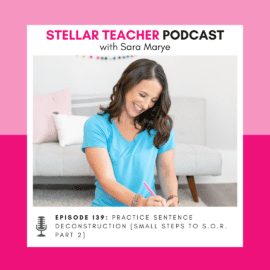
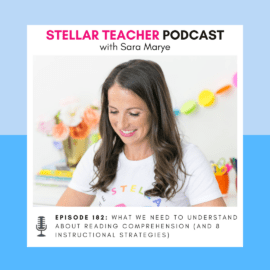
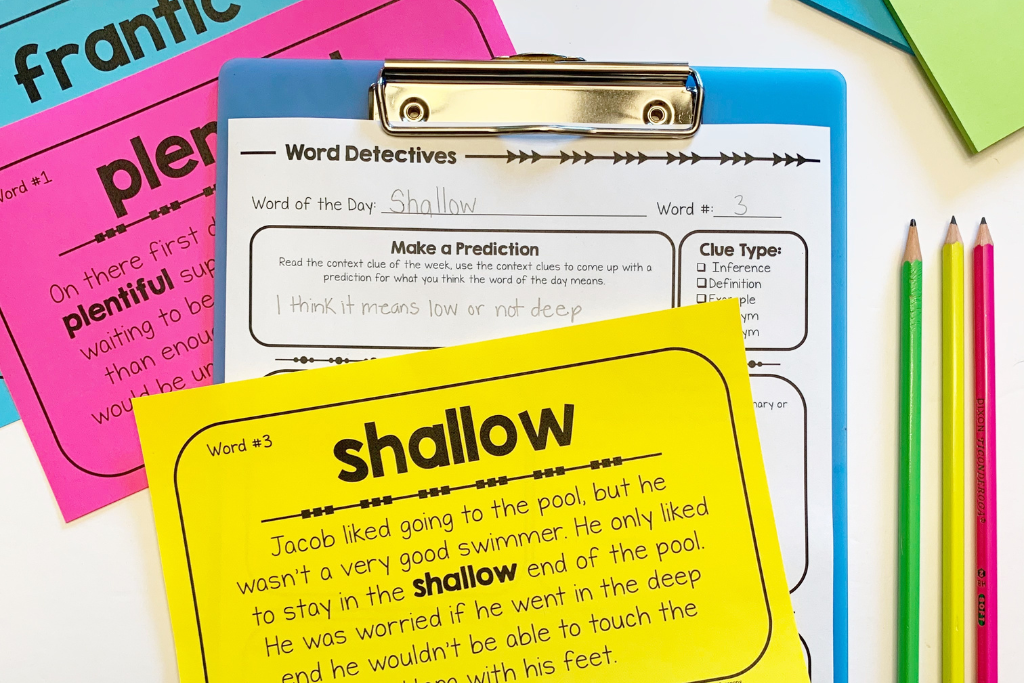

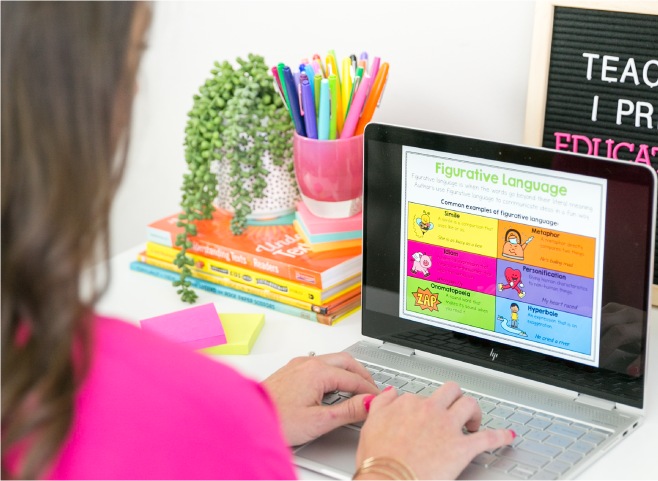
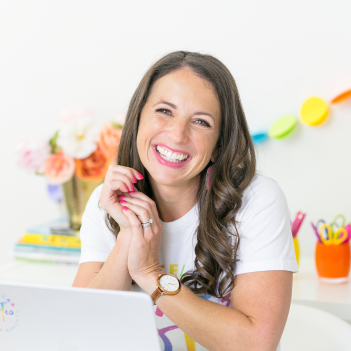
Leave a Comment
You must be logged in to post a comment.